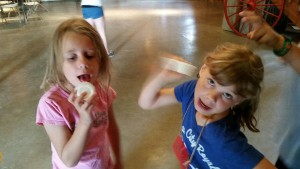By Savannah Lore
I have come full circle in my time working the Wornall-Majors Summer camp. I have worked a full camp though it was parts and pieces of different camps. Today’s theme was Frontier Living. It was all about things people had to do and make to survive on the frontier. We did chores and activities like butter making, candle making, weaving, dance games and rope making.
Here are some of our campers making butter. Some silliness is required to making very long task enjoyable.
So, a little about what I learned. From my entire experience, I have noticed a few things about interpreting history with children. The first is that doing interpretation is hard. Very Hard. Some of the times, I could just tell that they did not care. Either they got sidetracked by the activities or the just thought it was boring. And itt was hard to tell exactly what activity they would find interesting. I think it is also hard to talk seriously when they are doing projects that are a lot of fun. One day we had a presenter talk about the Underground Railroad, I think the presenter was good but the kids had to sit and listen without a craft to do. So, they lost focus easily. I think that the group also effects what they listen to or what they like because some times they do not focus or need more information. (We had young kids aged 6-12, some of the younger ones had way shorter attention spans.)
The second thing is I found it very hard to make something they thought was only one way but inform them of another idea. The first day was all about Native American cultures and I found myself wanting to talk much more seriously and at length about somethings that I thought needed to be explained to them, like why we use Native American and not “Indian.” This was also the only day that did not have a presenter (for scheduling reasons and other difficulties) and I think that would have given us a chance to talk more about the history of Native Americans and their culture. I think that this is not the problem of the program but a difficulty with interpreting history with children. I have also saw problems about teaching sensitive subjects like Native American culture. I think it is hard for the kids to understand that this isn’t a costume or a game and these are part of a culture and a people’s identity. So, at times, I can see that kids will unintentionally take the activities to that cultural appropriation line when we are trying hard to get them to respect and understand a culture.
The main lesson here is that it is very hard to get children to understand and focus on the history you are interpreting and making them respectful towards that information.
